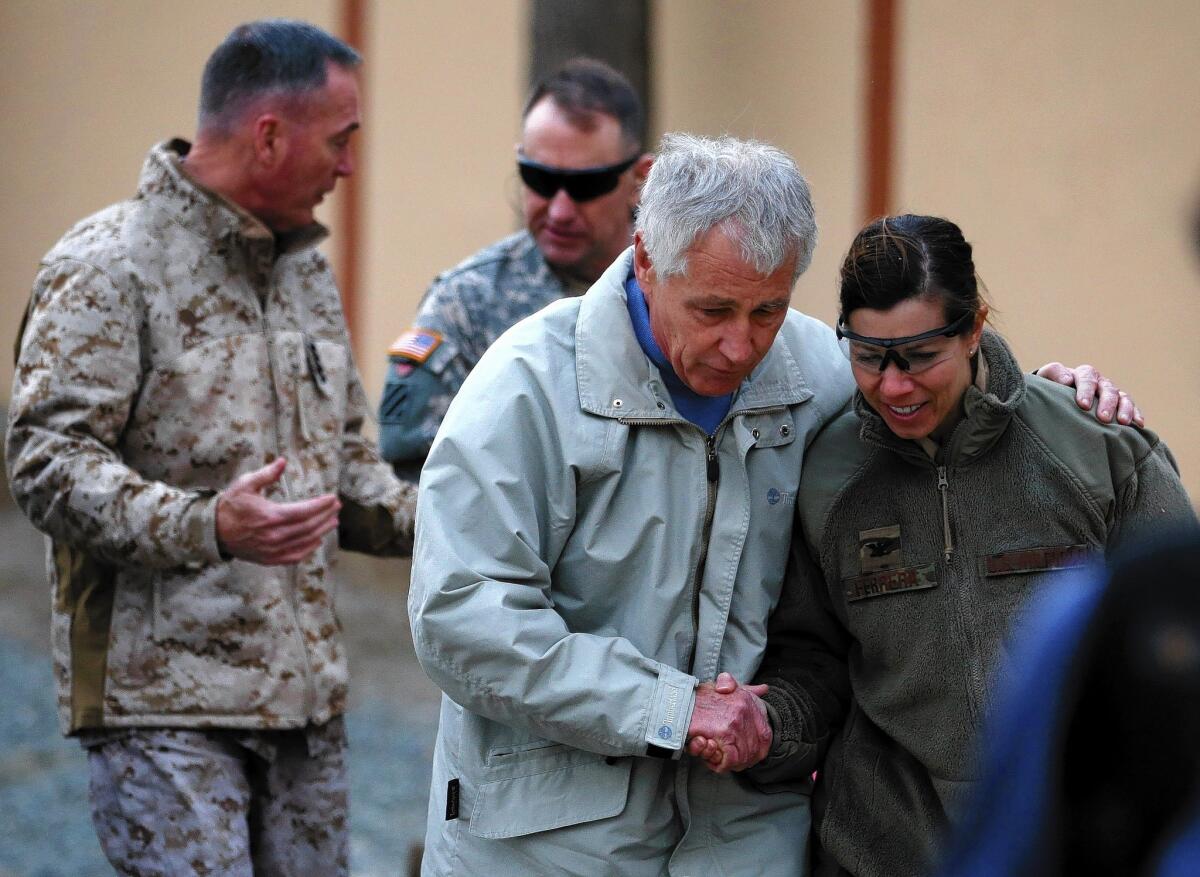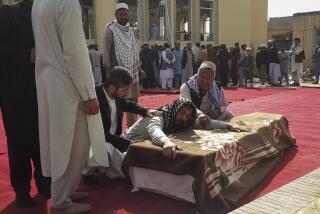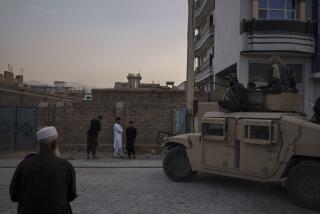Afghan official assures U.S. that security deal will be signed soon

- Share via
KABUL, Afghanistan — Defense Secretary Chuck Hagel, in Afghanistan on Saturday for a previously unannounced visit, said he had been assured by Afghanistan’s defense minister that a post-2014 bilateral security agreement would be signed soon.
Hagel, who landed in Afghanistan in secrecy while on a scheduled trip to the Middle East, said the defense minister, Bismullah Khan Mohammadi, told him earlier Saturday that the stalemated 10-year agreement would be signed “in a very timely manner.”
Afghan President Hamid Karzai agreed last month to the text of the 24-page accord, but has since refused to sign it. He has demanded that the U.S. cease attacks that invade Afghan homes and sometimes mistakenly kill civilians, and take a more central role in nascent peace negotiations with the Taliban.
Karzai’s defiance has frustrated U.S. officials, who have said there can be no continued American troop presence after combat forces withdraw at the end of 2014 unless the pact is signed by the end of this year. After that, the U.S. has said, the Pentagon and NATO partners would not have sufficient time to plan for post-2014 deployments. The agreement would permit U.S. military advisors and special operations counter-terrorism troops beginning in January 2015, with force levels to be determined by the White House.
Unlike other U.S. officials who have visited Kabul recently, Hagel did not meet with Karzai. He said there was nothing he could add that U.S. officials have not already told the Afghan president.
“That’s not my role — to pressure presidents,” Hagel told reporters.
In Washington, a senior defense official, speaking on background, said Hagel had no plans to meet with Karzai while in Afghanistan.
“The United States has made its position on the BSA clear,” the official said, referring to the bilateral security agreement. “And just two days ago, President Karzai repeated his position to senior U.S. officials that he is not yet ready to sign the BSA and provided no timeline or practical steps for doing so.”
Collapse of the security agreement would almost certainly end any chance of North Atlantic Treaty Organization nations contributing troops after 2014. It would also mean an end to billions of dollars in U.S. aid for development and for sustaining Afghan security forces.
Afghan businessmen and some members of Karzai’s inner circle have urged him to sign and avoid a collapse of Afghanistan’s aid-dependent economy. A 2,700-member grand council of influential Afghans, convened by Karzai, approved the agreement last month and recommended he sign it by Dec. 31.
Marine Gen. Joseph F. Dunford Jr., the top U.S. commander in Afghanistan, appeared with Hagel on Saturday and told reporters that delays were undermining confidence in Afghanistan.
Karzai has told U.S. officials that he prefers to wait until after the Afghan presidential election in April. He told the grand council, or loya jirga, that he doesn’t trust the United States and that the Americans don’t trust him.
Hagel said the main purpose of his trip was to visit with U.S. troops just before the holiday season and thank them for their service. He met Saturday with his counterpart, Mohammadi, and with Deputy Interior Minister Mohammad Ayub Salangi and the Afghan army chief of staff, Gen. Sher Mohammad Karimi.
The U.S. has spent billions of dollars training and equipping the Afghan army and police. The Pentagon says the forces will need more training and logistical assistance after 2014.
Washington seeks to maintain counter-terrorism forces after 2014 to hunt down Al Qaeda and Taliban extremists in an attempt to keep Afghanistan from again becoming a launching pad for terrorist attacks against the United States. The U.S. led an invasion of Afghanistan in 2001 after Al Qaeda planned the Sept. 11 attacks while on Afghan soil.
Times staff writer Zucchino reported from Kabul and Cloud from Washington.
More to Read
Sign up for Essential California
The most important California stories and recommendations in your inbox every morning.
You may occasionally receive promotional content from the Los Angeles Times.












